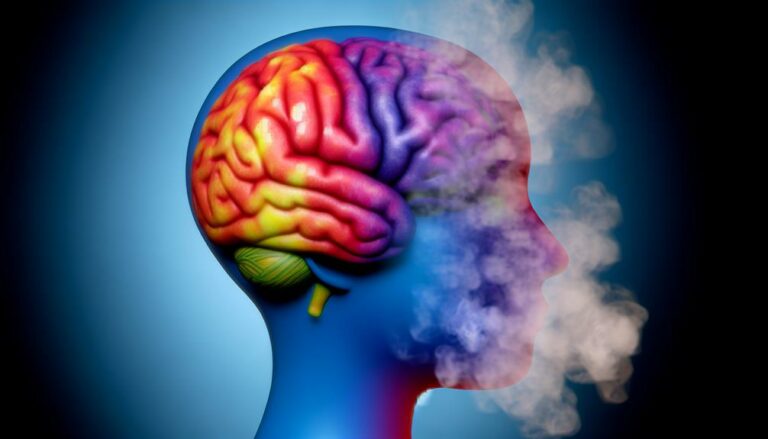You might have heard that cannabis is all fun and games until it starts messing with your mind. The impact on cognitive function, development of psychosis risk, and influence on anxiety levels are just the tip of the iceberg when it comes to chronic cannabis use.
But wait, there’s more. Dive deeper into the effects on memory retention, relationship to depression symptoms, and the impact on motivation and productivity.
Stay tuned to unravel the intricate web between chronic cannabis use and its influence on addiction potential and overall mental well-being.
Table of Contents
Impact on Cognitive Function
Chronic cannabis use has been shown to have a detrimental impact on cognitive function in various research studies. Regular consumption of cannabis can lead to impairments in attention, memory, and executive function. Users may experience difficulties in focusing on tasks, recalling information, and making decisions. These cognitive deficits have been observed not only during periods of intoxication but also persist beyond the acute effects of the drug.
Studies have indicated that chronic cannabis use, especially when initiated during adolescence, can result in long-lasting cognitive impairments. The developing brain is particularly vulnerable to the effects of cannabis, as it can interfere with the normal processes of neurodevelopment. This disruption can have significant implications for academic and occupational performance, as well as overall quality of life.
To mitigate the negative impact of chronic cannabis use on cognitive function, it’s essential to raise awareness about these potential consequences. Educating individuals, especially young adults, about the risks associated with prolonged cannabis use can help prevent further cognitive decline and promote healthier brain function.
Related Article: Cannabis Impact on Anxiety and Depression Explored
Development of Psychosis Risk
When considering the development of psychosis risk associated with chronic cannabis use, it’s crucial to examine the timelines of onset, the cognitive implications, and the varied factors contributing to this heightened vulnerability.
Research suggests that individuals engaging in long-term cannabis consumption may experience an earlier onset of psychosis symptoms, potentially influencing their cognitive functioning.
Analyzing risk factors such as genetic predispositions and environmental influences is essential in understanding the complex interplay between chronic cannabis use and the development of psychosis.
Psychosis Onset Timelines
At what stage in chronic cannabis use does the risk of psychosis onset typically become more pronounced? Research suggests that the risk of psychosis onset tends to increase with the duration and intensity of cannabis use. Here are some key points to consider:
- Early initiation of cannabis use in adolescence may elevate the risk of developing psychosis later in life.
- Individuals with a genetic predisposition to mental health disorders may be more susceptible to cannabis-induced psychosis.
- The potency of cannabis products, such as high-THC strains, can impact the likelihood of experiencing psychotic symptoms.
- Frequent and heavy cannabis use has been linked to an earlier onset of psychosis symptoms.
- Abrupt discontinuation of cannabis after long-term use may also trigger psychotic episodes in some individuals.
Impact on Cognition
The cognitive impairments observed in individuals with a heightened risk of developing psychosis due to chronic cannabis use manifest in various domains of cognitive function. Research indicates that chronic cannabis use can lead to deficits in attention, memory, and executive functions, which are crucial for daily tasks and decision-making.
These impairments can affect your ability to focus, remember information, and plan ahead effectively. Studies have shown that individuals at risk of psychosis who use cannabis heavily may experience more severe cognitive deficits compared to those who don’t use cannabis or use it in moderation.
Understanding these cognitive impacts is essential in assessing the overall mental health risks associated with chronic cannabis use and the development of psychosis.
Risk Factors Analysis
Chronic cannabis use is associated with an increased risk of developing psychosis, with certain individuals exhibiting heightened vulnerability due to specific risk factors. Understanding these risk factors can help identify individuals at greater risk.
- Genetic predisposition: Some individuals may have genetic variations that make them more susceptible to the development of psychosis with cannabis use.
- Early age of onset: Initiating cannabis use during adolescence, when the brain is still developing, can increase the risk of psychosis.
- Frequency and dosage: Higher frequency and dosage of cannabis use have been linked to an elevated risk of psychosis.
- Co-occurring mental health conditions: Individuals with pre-existing mental health disorders may be more prone to cannabis-induced psychosis.
- Environmental stressors: High levels of stress or trauma can interact with cannabis use, contributing to the development of psychosis.
Influence on Anxiety Levels
Long-term cannabis use has been linked to fluctuations in anxiety levels, revealing a complex relationship between the two. Research indicates that while some individuals report using cannabis to alleviate anxiety symptoms, prolonged or heavy use can paradoxically lead to increased anxiety levels. The endocannabinoid system, which is influenced by cannabis consumption, plays a crucial role in regulating stress and anxiety responses in the brain.
Studies have shown that chronic cannabis use can disrupt the natural balance of this system, potentially exacerbating anxiety symptoms over time. The specific effects can vary among individuals, with some experiencing heightened anxiety, while others may find temporary relief. It’s essential to consider factors such as the frequency, dosage, and potency of cannabis consumed when assessing its impact on anxiety levels.
Furthermore, individuals with pre-existing anxiety disorders may be more susceptible to the negative effects of long-term cannabis use on anxiety. Monitoring anxiety levels and seeking professional guidance are crucial for those who use cannabis regularly and experience fluctuations in anxiety.
Effects on Memory Retention
Chronic cannabis use can pose risks for memory impairment, potentially leading to short-term memory loss and cognitive decline.
Research suggests that consistent marijuana consumption may interfere with the brain’s ability to form new memories and retrieve existing ones efficiently.
Understanding the impact of cannabis on memory retention is crucial for assessing the overall cognitive effects of long-term use.
Memory Impairment Risks
Excessive cannabis use has been linked to a significant decline in memory retention, particularly affecting short-term memory functions. Research shows that chronic cannabis consumption can lead to memory impairment risks, impacting cognitive functions.
- Hippocampal Damage: Cannabis can cause structural changes in the hippocampus, a brain region crucial for memory formation.
- Encoding Difficulties: Users may struggle with encoding new information into memory effectively.
- Retrieval Challenges: Recalling stored memories becomes more difficult with prolonged cannabis use.
- Interference with Consolidation: Cannabis can disrupt the process of converting short-term memories into long-term ones.
- Impaired Working Memory: Tasks requiring active manipulation of information may be particularly affected.
Short-Term Memory Loss
With continued cannabis use, you may experience notable disruptions in your ability to retain and recall information in the short term, impacting your overall memory function. Research suggests that short-term memory loss is a common cognitive impairment associated with chronic cannabis use.
This type of memory loss can manifest as difficulties in remembering recent events, conversations, or tasks. The active compounds in cannabis, particularly THC, can interfere with the proper functioning of the hippocampus, a brain region crucial for memory formation.
Studies have shown that regular cannabis consumption can lead to deficits in short-term memory retrieval and encoding processes. These memory impairments can affect various aspects of daily life, such as learning new information, concentrating on tasks, and recalling recent events accurately.
Cognitive Decline Potential
Prolonged cannabis use may lead to a decline in cognitive function, particularly affecting memory retention capabilities. Research indicates the following effects on memory retention:
- Impaired short-term memory recall
- Reduced ability to concentrate
- Difficulty in learning new information
- Challenges in forming new memories
- Increased forgetfulness in daily tasks
These findings suggest that chronic cannabis use can significantly impact memory retention, potentially affecting daily functioning and cognitive performance.
It’s essential to consider these cognitive effects when evaluating the long-term consequences of cannabis use on mental health and overall well-being.
Relationship to Depression Symptoms
Chronic cannabis use has been linked to an increased risk of experiencing symptoms of depression. Research indicates that individuals who use cannabis regularly are more likely to report feelings of sadness, hopelessness, and a lack of interest in activities they once enjoyed. The relationship between cannabis use and depression symptoms is complex, with studies suggesting that the psychoactive compounds in cannabis can alter brain chemistry and neurotransmitter levels, potentially contributing to mood disturbances.
Moreover, chronic cannabis use may interfere with the brain’s natural reward system, leading to a cycle of dependence and withdrawal that can exacerbate feelings of depression. Additionally, individuals who use cannabis heavily may experience social and occupational problems, which can further contribute to depressive symptoms.
It is essential to consider the potential impact of chronic cannabis use on mental health, particularly regarding its association with depression symptoms. Seeking professional help and support is crucial for individuals experiencing depression in the context of cannabis use.
Impact on Motivation and Productivity
Frequent cannabis use may impact motivation and productivity levels in individuals. Research suggests the following effects on motivation and productivity:
- Decreased Initiative: Chronic cannabis use has been linked to decreased initiative in tasks and activities, leading to reduced drive and goal-directed behavior.
- Impaired Cognitive Function: Cannabis can impair cognitive functions such as memory, decision-making, and problem-solving, affecting overall productivity levels.
- Procrastination: Individuals who frequently use cannabis may experience increased tendencies to procrastinate, impacting their ability to stay focused and complete tasks efficiently.
- Lack of Energy: Cannabis use can contribute to feelings of lethargy and lack of energy, which can hinder motivation to engage in productive activities.
- Difficulty Concentrating: Cannabis’s effects on attention and concentration may result in difficulties focusing on tasks, further affecting productivity levels.
Understanding these potential impacts can help individuals make informed decisions regarding their cannabis use and its effects on motivation and productivity.
Influence on Addiction Potential
Cannabis use can influence the potential for addiction development. Research indicates that chronic cannabis use can lead to the development of addiction, particularly in individuals predisposed to substance abuse disorders. The psychoactive compound in cannabis, THC, interacts with the brain’s reward system, leading to the release of dopamine, a neurotransmitter associated with pleasure and reinforcement. Over time, this repeated activation of the reward system can result in a tolerance to the effects of cannabis, prompting individuals to consume higher doses to achieve the same high, thus increasing the risk of addiction.
Moreover, long-term cannabis use can also alter the brain’s natural endocannabinoid system, which plays a crucial role in regulating mood, memory, and reward processing. These alterations can further contribute to the development of addictive behaviors. Individuals with a history of substance abuse or mental health disorders may be particularly vulnerable to the addictive potential of cannabis. It’s essential for individuals using cannabis chronically to be aware of these risks and seek help if they experience signs of addiction.
Effects on Overall Mental Well-being
Excessive consumption of cannabis can have profound impacts on your overall mental well-being, extending beyond addiction risks to encompass various aspects of cognitive and emotional functioning. Chronic cannabis use may lead to impaired memory and cognitive function, affecting your ability to learn and retain information.
Increased risk of developing mental health disorders such as anxiety and depression is another consequence of chronic cannabis use. Disturbances in sleep patterns, leading to insomnia or excessive daytime sleepiness, can also result from excessive consumption. Impaired judgment and decision-making skills may impact various areas of your life, while reduced motivation and productivity can hinder your ability to engage in daily activities effectively.
Research suggests that the effects of cannabis on mental well-being can vary based on individual factors such as frequency of use, potency of the cannabis, and genetic predispositions. It’s essential to consider these potential consequences when evaluating the impact of chronic cannabis use on your overall mental health.
Frequently Asked Questions
How Does Chronic Cannabis Use Impact Creativity and Problem-Solving Abilities?
Chronic cannabis use can impact creativity and problem-solving abilities, potentially hindering cognitive functions. Research suggests that long-term use may impair cognitive flexibility and divergent thinking, affecting your ability to generate innovative ideas and solve complex problems efficiently.
Can Long-Term Cannabis Use Lead to Social Withdrawal and Isolation?
Long-term cannabis use can contribute to social withdrawal and isolation. Research indicates that excessive consumption may lead to decreased motivation and engagement in social activities, impacting relationships and overall social interactions. It’s crucial to monitor these effects.
Are There Specific Strains or Methods of Consumption That Are Less Harmful to Mental Health?
For mental health, low-THC/high-CBD strains and non-smoking methods like edibles or oils may be less harmful. Consult a healthcare professional for personalized advice. Monitor your reactions and seek help if needed.
How Does Chronic Cannabis Use Affect Decision-Making and Impulse Control?
Chronic cannabis use can impact decision-making and impulse control, affecting your ability to make sound choices and regulate behaviors. Research suggests a link between long-term marijuana consumption and alterations in cognitive functions related to these processes.
What Role Does Genetics Play in How Cannabis Use Affects Mental Health Outcomes?
Genetics substantially influence how cannabis use impacts mental health outcomes. Your unique genetic makeup can determine susceptibility to certain mental health conditions exacerbated by cannabis. Research suggests genetic factors play a significant role in mental health effects.
Conclusion
Overall, chronic cannabis use has been shown to have significant effects on mental health. From impacting cognitive function and increasing the risk of developing psychosis, to influencing anxiety levels and memory retention, the consequences are clear. Additionally, cannabis use has been linked to symptoms of depression, reduced motivation, and potential for addiction.
Understanding these effects is crucial for individuals to make informed decisions about their mental well-being when using cannabis.




